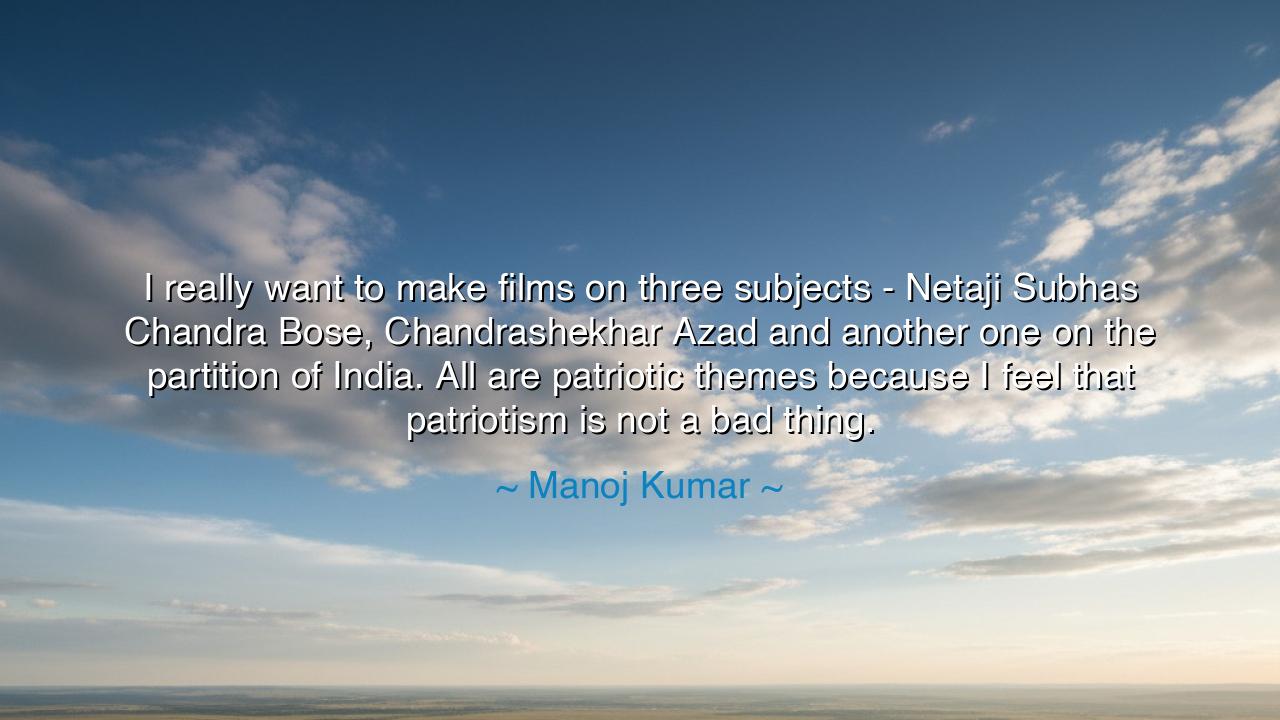
I really want to make films on three subjects - Netaji Subhas
I really want to make films on three subjects - Netaji Subhas Chandra Bose, Chandrashekhar Azad and another one on the partition of India. All are patriotic themes because I feel that patriotism is not a bad thing.






Hear, O sons and daughters of the soil, the words of Manoj Kumar, the poet of cinema and the chronicler of India’s spirit: “I really want to make films on three subjects – Netaji Subhas Chandra Bose, Chandrashekhar Azad and another one on the partition of India. All are patriotic themes because I feel that patriotism is not a bad thing.” In this utterance lies both passion and truth. For he, who gave his life to art, sought not only to entertain but to awaken the sleeping fire of a people. To him, patriotism was not a weapon of division, but a song of remembrance, a way to honor the sacrifices that purchased freedom with blood and tears.
The origin of these words is rooted in the life of Manoj Kumar, often called “Bharat Kumar” for his immortal roles in films that celebrated India’s struggle and its soul. At a time when the world often scoffed at patriotism as outdated, Kumar stood firm. He reminded his people that patriotism is not blind nationalism, but gratitude, memory, and responsibility. In speaking of Bose, Azad, and Partition, he invoked the very crucibles that forged modern India, and through them sought to remind the generations that liberty was not born cheaply.
Consider Netaji Subhas Chandra Bose, who left comfort and safety to raise the Indian National Army. He called upon men and women to give him their blood, that he might give them freedom. His journey was filled with exile, struggle, and the shadow of uncertainty, yet his spirit shook the foundations of the empire. To tell his story is to remind us that patriotism sometimes demands the abandonment of self for the sake of the nation’s soul.
Think also of Chandrashekhar Azad, who swore never to be taken alive by the oppressor’s hands. His courage burned like a torch in the night of slavery. Young, unyielding, fierce—he embodied the spirit of defiance. In choosing to make films about such men, Kumar sought to breathe life into their memory, to show that patriotism is not hatred, but sacrifice, not arrogance, but the will to resist injustice. Their lives were not perfect, but they were luminous, carved in fire against the darkness of oppression.
And then, the tragedy of the Partition of India—a wound that bled across borders, tearing apart families, scattering millions, burning homes, and yet teaching the people the price of freedom. To portray Partition is to portray the double edge of history: the joy of liberty intertwined with the agony of separation. Kumar, in choosing this subject, declared that patriotism is also remembering pain, so that such wounds may not be repeated, and so that love of country may be tied to compassion for one’s fellow beings.
The meaning of Kumar’s words is thus twofold: first, that patriotism is not evil when it is grounded in memory, sacrifice, and love; and second, that art has the sacred duty of carrying these lessons forward. Too often do men forget the struggles of their ancestors and treat freedom as a gift easily won. But through stories, songs, and films, the spirit of the past can be rekindled, guiding the present toward nobility and unity.
The lesson for us is clear: cherish your homeland, not with empty slogans, but with deeds that honor its heroes and heal its wounds. Patriotism is not a blind cry of superiority; it is the duty to remember, to preserve justice, and to build a future worthy of the sacrifices of Bose, Azad, and the millions who endured Partition. To love one’s country is to serve its people, to defend its freedom, and to keep alive the memory of those who gave their all.
Practical counsel follows: read of your heroes, and let their courage shape your own. Watch or create works of art that honor their spirit. Serve your land with honesty, whether in small acts of citizenship or in great labors of leadership. And above all, never despise patriotism, for it is not a bad thing—it is the root that binds you to the soil, the memory of your ancestors, and the destiny of your children.
So let Manoj Kumar’s words echo like a hymn: “All are patriotic themes because I feel that patriotism is not a bad thing.” Take them as a call to live with gratitude, courage, and vision. For a nation is not held by stone or law alone, but by the spirit of its people—and when that spirit is alive, no force of history can devour it.






AAdministratorAdministrator
Welcome, honored guests. Please leave a comment, we will respond soon